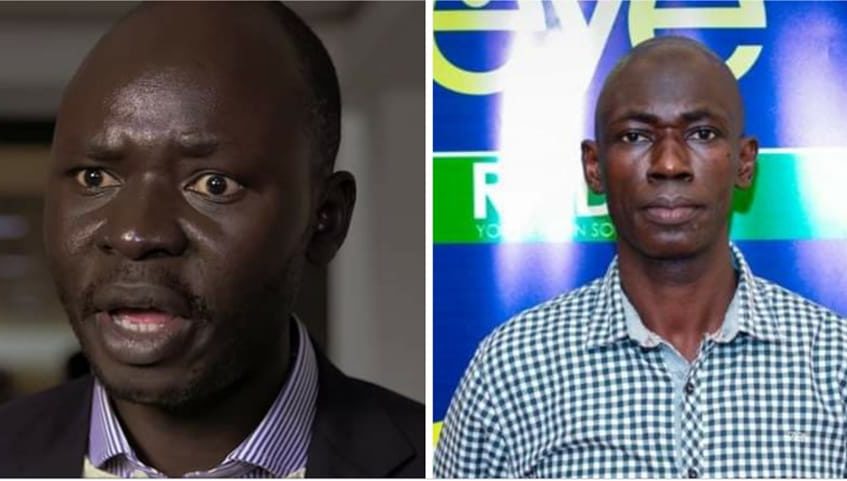
Exiled activist, Dr. Peter Biar Ajak [left], and CEPO Executive Director, Edmond Yakani [right] - credit | Eye Radio/Courtesy
Activists and some members of public have expressed mixed feelings ahead of next year’s elections
An exiled activist, Peter Biar Ajak says South Sudanese never had the chance to elect their own leaders, and the country needs to go for credible elections.
Biar’s call comes two days after the EU ambassador to South Sudan, Christian Bader said he was not convinced the country is ready to hold elections next year.
Diplomat Bader cited lack of civic space, freedom of expression and infrastructural development, among others
But Biar says election is the only way to end what he calls ‘bleeding and looting in the country.
The September 2018 peace deal obligates the unity government to hold elections three months before the end of the transitional period to establish a democratically elected government.
In November last year, President Salva Kiir told the country that the much-anticipated general elections would take place as planned.
This is despite delays in the implementation of some key tasks such as the unification of forces, repatriation of refugees and the conduct of population census.
In an interview with the Kenyan Television, KTN Monday, Peter Biar appealed to the AU and UN to safeguard a credible election in 2023.
“We are asking the African Union and the United Nations to ensure that the elections that will be held in South Sudan next year are free, fair and credible,” Biar said.
“We want to be able to elect our own leaders. We never had that chance and we have been talking about it, our country is bleeding.”
For his part, Edmond Yakani, Executive Director of the Community for Progress organizations says there is no conducive environment for free and fair elections.
He called on the unity government to first assess the general condition in the country before elections.
“We are not against the election but our statement is to assess the current situation, is it favorable for elections, where a state like Jonglei is flooded, its citizens are displaced in Jonglei and moved to Eastern Equatoria,” Yakani said.
“Who are going to be the voters in those constituencies that are flooded in the seven states? How are you going to manage them?
“I am calling upon the leaders of the country to urgently sit and assess the situation and manage decisions.
“Viability of credible elections is not going to be there unless we are going for policing elections or elections where we can use tribal confirmation that X is now our MP.
“The context and infrastructure is really challenging us in conducting elections.”
Public
Meanwhile, some members of the public have expressed the same concern raised by the EU Ambassador concerns on the move to hold elections next year.
They attributed this to failure by the peace parties to implement most of the provisions in the revitalized peace agreement, especially the security arrangement.
A resident at Protection of Civilians Side in Juba, who identifies himself as Gatkuoth, told Eye Radio that lack of freedom of expression in the country remains a challenge to conduct credible elections.
“I am seeing everything he [EU Ambassador] says is true because whatever the agreement was all about has not come to place. Like the graduation of the unification forces,” Gatkuoth said.
“People are really being restricted from their views being heard. That is what sparked the protests in Jonglei.
“The EU should give more pressure than what it is doing now so that peace should come. The agreement is still lacking a lot of elements and for that, I also doubt the possibility of elections.”
A resident of Juba, James Duor told Eye Radio that elections may not take place since the peace agreement is not fully implemented.
“I see that the elections cannot be conducted on time, because the agreement is not yet implemented fully such as the graduation of the unified forces, some of the peace elements have not reached the states,” Duor said.
“Many people talk about elections and say that the elections cannot be conducted, so the government and the opposition parties should graduate the forces so that there will be security in the Capital as well as in the states.”
A resident of Aweil, Sibu Kida – not his real name, told Eye Radio that elections will not take place because most of the provisions in the peace agreement have not yet been implemented.
“According to my opinion about the elections, it seems the elections will not be conducted except that we extend the transitional period because we are left with about ten months to the end of Transitional period,” a resident in Aweil said.
“There is not enough time for the unified forces to be graduated and deployed and the security arrangements have not yet completed.
“The census has not yet been done and there is no arrangement for it, and the census can’t be conducted within the remaining tenth months.”
South Sudan has never held a general election since its independence in 2011.
The first general election was scheduled to take place on the 9th of July 2015.
However, the country descended into years of civil war, prompting the parliament to extend the presidential term until July 2018.
Support Eye Radio, the first independent radio broadcaster of news, information & entertainment in South Sudan.
Make a monthly or a one off contribution.
Copyright 2024. All rights reserved. Eye Radio is a product of Eye Media Limited.